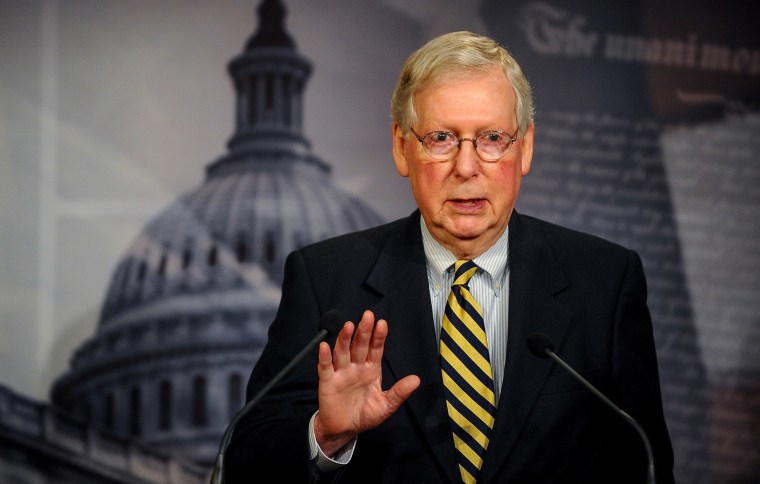After the details of the latest economic aid package came together yesterday afternoon, House Speaker Nancy Pelosi (D-Calif.) and Senate Minority Leader Chuck Schumer (D-N.Y.) issued a joint statement that looked ahead to the next round of negotiations. After this passes the House, the Democratic leaders said, "we will advance CARES 2, which must be transformative and far-reaching."
It was around this same time that Senate Majority Leader Mitch McConnell (R-Ky.) started tempering those ambitions. As Politico reported, the Kentucky Republican "signaled he is growing weary of quickly shoveling billions of dollars out the door even as the economy continues to crater."
McConnell said the Senate will proceed "cautiously" to the next phase of coronavirus relief despite rapidly escalating demands for more aid from members of both parties.... "You've seen the talk from both sides about acting, but my goal from the beginning of this, given the extraordinary numbers that we're racking up to the national debt, is that we need to be as cautious as we can be," McConnell said.
The Senate leader's comments reverberated for a reason: McConnell is obviously one of the dominant power players in D.C. If he's sending unmistakable signals about the next round of economic aid negotiations, it raises the very real possibility of the federal spigot being turned off, despite the public's needs.
But lurking in the background was a question McConnell isn't accustomed to hearing: is the Senate GOP leader's influence waning during the coronavirus pandemic? He may not want another massive bill, but what if his preferences won't necessarily dictate the outcome?
In mid-March, it was Nancy Pelosi and Treasury Secretary Steven Mnuchin who negotiated the Families First Coronavirus Response Act. McConnell emerged from the sidelines to criticize the bill, but he passed it anyway.
A few days later, McConnell sought to establish certain parameters for the multi-trillion-dollar CARES Act, unveiling his own legislative blueprint. Democrats immediately dismissed it out of hand and got to work negotiating a vastly superior alternative.
When the Paycheck Protection Program started running out of money, McConnell said he would not negotiate with Democratic leaders and he wasn't interested in any bill that went beyond a proposal to infuse the small-business program with $250 billion. This led Pelosi and Schumer to circumvent the Republican leader, negotiate a much larger and better package with Mnuchin, and watch as McConnell passed it with nary a discouraging word.
It's against this backdrop that McConnell wants to scale back expectations for the next aid package. I don't doubt that the GOP leader means it, but I'm not sure he's necessarily in charge to the degree he's accustomed to.
Indeed, it's not hard to imagine a scenario unfolding in the coming weeks in which the need for more federal economic lifelines becomes obvious; Democratic leaders call for another round of negotiations; Mnuchin agrees to talks; and Donald Trump tells lawmakers how eager he is to throw more money at the problem to keep the economy from getting even worse in an election year.
McConnell won't like it, but is he prepared to reject an economic bill backed by his own party's White House during a pandemic and 20% unemployment?
The Senate majority leader has been on the losing end of several fights lately. Don't be surprised if that continues.

